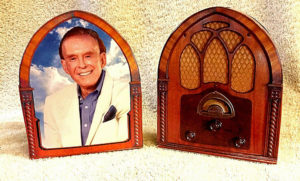 By Steve Crum
By Steve Crum
It was in 1971 when I met Frank Bresee. Then I met him again in 2003, 32 years later. The truth is, it was sort of a one-way meet in ’71. He didn’t know me then, but each and every week that year—and part of 1972, I visited him.
=====
Frank Bresee (1929-2018) was a show business historian who made his name via his The Golden Days of Radio, a weekly radio broadcast that was launched in 1949 and continued through syndication for over 40 years. It became radio’s longest running old-time radio show in entertainment history.
The half-hour program began with an announcer’s “Next…The Golden Days of Radio,” followed by the rousing, instrumental theme to “Manhattan Merry-Go-Round.” The show itself was fast paced, very light hearted, entertaining nostalgia hosted by Frank Bresee. Bresee would play either complete radio broadcasts or excerpts from any of the thousands of original radio transcription disks in his humongous collection. On any given episode, one 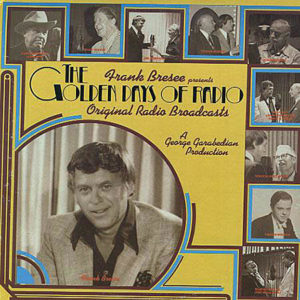 would hear the likes of Amos ’n’ Andy, The Lone Ranger, The War of the Worlds with Orson Welles, Bob Hope, Jack Benny, The Shadow, and on and on. Now and then, there would be a show dedicated to radio bloopers…or radio commercials…or famous radio announcers. There were special Christmas shows featuring holiday broadcasts from the 1930s-‘40s. Often, he would interview still living stars of radio (and sometimes movies) like Mae West, Edgar Bergen, Jim Jordan (aka Fibber McGee), and Fred Foy, who voiced The Lone Ranger’s opening spiel for decades.
would hear the likes of Amos ’n’ Andy, The Lone Ranger, The War of the Worlds with Orson Welles, Bob Hope, Jack Benny, The Shadow, and on and on. Now and then, there would be a show dedicated to radio bloopers…or radio commercials…or famous radio announcers. There were special Christmas shows featuring holiday broadcasts from the 1930s-‘40s. Often, he would interview still living stars of radio (and sometimes movies) like Mae West, Edgar Bergen, Jim Jordan (aka Fibber McGee), and Fred Foy, who voiced The Lone Ranger’s opening spiel for decades.
Throughout the program, Bresee’s distinctive voice perfectly blended with his obvious love and respect for whichever program was being spotlighted. And he made it fun and interesting in the process.
Incidentally, Bresee was not just a radio show collector and host. He had performed on radio in 1942 as the voice of Little Beaver on Red Ryder. He acted in other shows too, and became a technical adviser for various radio and TV shows. He even invented several board games, the most famous being Pass-Out, an adult drinking game that sold in the millions. It alone made Bresee a very wealthy man.
Frank Bresee’s passion for preserving and promoting vintage radio shows triggered my passion in enjoying and collecting similar material. That began when I first listened to The Golden Days of Radio when I was stationed at a U. S. Army post near Kaiserslautern, Germany from 1971-72.
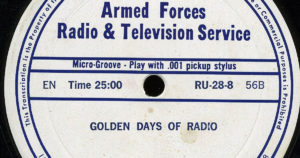 Homesick and alone while in my barracks most of the time, I listened to the Armed Forces Radio Service, a military-sponsored network broadcast outside the USA to our servicemen and women worldwide. Beginning in 1967, Bresee’s show was a must-hear weekly program on AFRS, continuing for the next 29 years. I not only loved the show, but increasingly thrived upon it. It offered terrific escape through ”Theatre of the Mind” entertainment.
Homesick and alone while in my barracks most of the time, I listened to the Armed Forces Radio Service, a military-sponsored network broadcast outside the USA to our servicemen and women worldwide. Beginning in 1967, Bresee’s show was a must-hear weekly program on AFRS, continuing for the next 29 years. I not only loved the show, but increasingly thrived upon it. It offered terrific escape through ”Theatre of the Mind” entertainment.
I copied the shows on cassette tapes, and I am glad I did. Within a few years, after I was discharged from the Army, I taught a unit on the history of radio in high school mass media classes for 20 years. Bresee’s passion had passed to me, and then on to hundreds of appreciative and informed students. The recordings were vital to my curriculum. Let me clarify that I did not play all of them for my classes. But what supplemental material!
Fast forward to 2003. I am home alone—and quite lonely, this time following a divorce. On a Friday night, I am in my basement, exploring the web on my iMac. Grabbing my attention is The Friday Night Show site on the USA Network that played old time radio shows, and hosted by…Frank Bresee! It is broadcast live, and Bresee keeps encouraging listeners to call in. In those days, long distance calls were expensive, but this was done via the computer, so we could chat through the embedded microphone and speakers, free of charge. (Bresee was broadcasting from Los Angeles.)
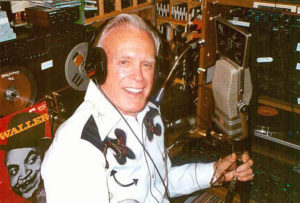 At that moment, karma meshed with deja vu. My memory shot back to my Army years—listening to radio—Golden Days of Radio—Bresee. I made the call, and Frank Bresee immediately picked up. Unreal. After introducing myself and telling him from where I was calling (Kansas City, Kansas), he told me he was impressed by my (to him) distant location. I spoke about listening to him in Germany, about taping his great shows and using them in high school teaching, and about how I could not believe this surreal moment of actually talking to him. While he kept trying to nail down what specific radio shows I used in my media classes, I kept yammering about what a positive impact he had on me. When he kept going back to talking about my curriculum, I kept repeating my “wow” comments. I was gushing effusively. It was shameful, but I could not control myself.
At that moment, karma meshed with deja vu. My memory shot back to my Army years—listening to radio—Golden Days of Radio—Bresee. I made the call, and Frank Bresee immediately picked up. Unreal. After introducing myself and telling him from where I was calling (Kansas City, Kansas), he told me he was impressed by my (to him) distant location. I spoke about listening to him in Germany, about taping his great shows and using them in high school teaching, and about how I could not believe this surreal moment of actually talking to him. While he kept trying to nail down what specific radio shows I used in my media classes, I kept yammering about what a positive impact he had on me. When he kept going back to talking about my curriculum, I kept repeating my “wow” comments. I was gushing effusively. It was shameful, but I could not control myself.
Bresee was very kind, and very patient. But he was forced to end my interview with the half-humorous comment, “I feel like you are delivering the eulogy at my funeral.” Then he thanked me, and the connection was over. I could not wait to hang up and pull myself together.
At least it is a certainty that Frank Bresee knew I greatly appreciated him. He impacted my teaching career as well as my passion for show business.
=====
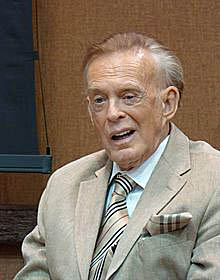 After his death last year, Bresee’s collection of radio scripts, props, related photos, and recordings of over 10,000 radio programs was donated to the Thousand Oaks Library Special Collection in Thousand Oaks, California.
After his death last year, Bresee’s collection of radio scripts, props, related photos, and recordings of over 10,000 radio programs was donated to the Thousand Oaks Library Special Collection in Thousand Oaks, California.
Thanks to Frank Bresee’s inspiration, I had accumulated a hefty collection of radio shows myself—about 1,400 hours on reel-to-reel tapes. Several years ago, after retiring from teaching, I donated all of them to The University of Kansas. Paying it forward time.
=====
For a terrific biographical film about Frank Bresee, check out this site:
